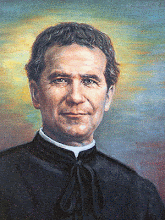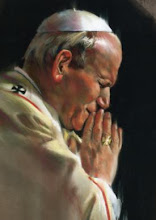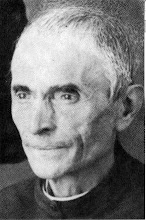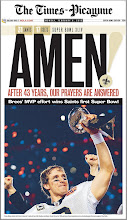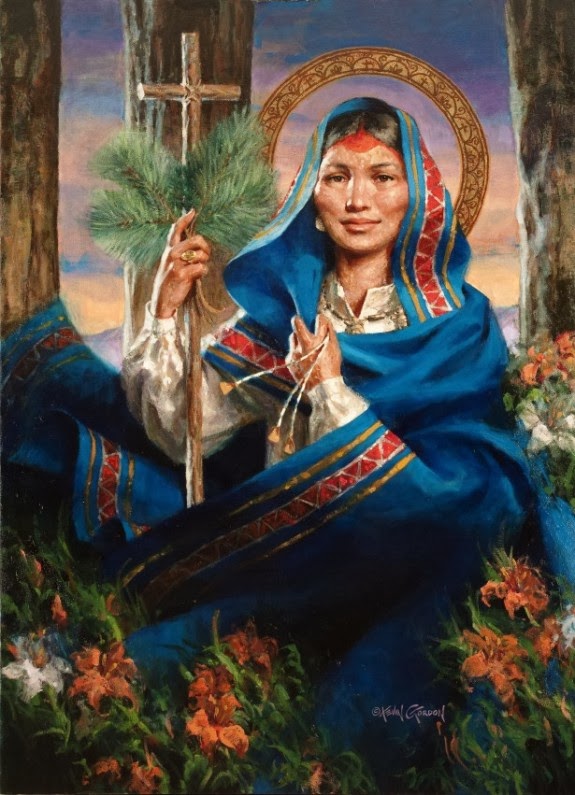Thirty years ago, on Aug. 31, 1980, an electrician named Lech Walesa signed the Gdansk Accords, ending a two-week-old strike at that Hanseatic city’s Lenin Shipyards. Walesa signed with a giant souvenir pen featuring a portrait of Pope John Paul II. The choice of pen was not, as Marxists might have said, an accident. Neither was the distinctive revolution that unfolded in the wake of the Gdansk Accords, which were forged over two weeks of high drama on Poland’s Baltic coast.
Tuesday, August 31, 2010
The Solidarity Difference by George Weigel
Thirty years ago, on Aug. 31, 1980, an electrician named Lech Walesa signed the Gdansk Accords, ending a two-week-old strike at that Hanseatic city’s Lenin Shipyards. Walesa signed with a giant souvenir pen featuring a portrait of Pope John Paul II. The choice of pen was not, as Marxists might have said, an accident. Neither was the distinctive revolution that unfolded in the wake of the Gdansk Accords, which were forged over two weeks of high drama on Poland’s Baltic coast.
Cardinal Zen hopeful situation in China will improve for Catholics
The Bishop Emeritus of Hong Kong, Cardinal Joseph Zen, said this week he hopes the situation for Catholics in China will improve despite the religious freedom difficulties that exist in the country. He added that the testimony of the faithful amidst widespread repression is fundamental for the future of the Catholic Church there.
According to L’Osservatore Romano, Cardinal Zen recently accompanied a group of nine Chinese Salesian sisters at Pope Benedict XVI’s general audience at Castel Gandolfo. Regarding the situation for Catholics in China he said, “It is important to follow the guidelines laid out by the Pope in this 2007 letter to Catholics in China,” which still has not been widely read due to government repression.
The future of the Church in China depends on the silent but efficacious testimony of Catholics in country, the cardinal continued.
Referring to the Salesian sisters, Cardinal Zen said, “The fact that they live amidst the people and are committed to ordinary tasks gives particular weight to their testimony.”
Salesians in Pakistan assisting 150,000 impacted by flooding
‘We will bury Katrina,’ New Orleans archbishop declares on fifth anniversary
Five years after the Hurricane Katrina disaster, Archbishop of New Orleans Gregory Aymond remembered the dead and thanked those who have helped recovery work. He noted that the symbolic funeral residents held for Katrina shows that it is time “to let her go.”
“Five years ago Katrina, the unwelcomed guest, did ravage on our city and left incredible destruction,” the archbishop said in a video posted on August 29 at the archdiocese’s website.
“We stand here five years later in a spirit of hope and gratitude, with hope for those who have died. We cannot forget the hundreds who died. We commend them to God’s kingdom and ask God’s blessings on their families as they grieve.”
“On Saturday morning we will bury Katrina,” said the archbishop. “We will have a jazz funeral. We’re hoping she doesn’t resurrect. It is a very symbolic gesture … that it is time to let her go. But we must move on to hope and to the future.”
The archbishop expanded on his remarks in a Sunday reflection.
“It would be easy to allow those feelings of confusion, anxiety, and despair from five years ago to creep back into our heads and spirits, but today, we must ask God to help us to rise above those feelings and allow our loving God to replace them with renewed feelings of faith and hope,” he commented.
Acknowledging that he cannot fully understand the emotions of Katrina’s victims because he was not living in New Orleans at the time of the disaster, he said that the strength of people is “amazing.”
“I am constantly inspired by the stories of those who have rebuilt and those who found solace in their faith and in love of God, family and neighbor. This is what makes New Orleans special. Your faith in God inspires me!”
“There is tremendous hope here,” he added in his video.
He pledged help from the Catholic Church to those who are still rebuilding.
“I promise to do all within our means to help you though your pain and your struggles and to be the heart of Jesus Christ to you in your time of need,” he told the disaster’s victims. “We must not forget Katrina, but must use those experiences to grow and strengthen our families and communities so that we may be an example of God’s hope to our neighbors and the rest of the country.”
In the video, the archbishop also praised the “incredible work” of Catholic charities and reported that the organization had helped provide over $55 million in aid to the hurricane’s victims. He thanked other Catholic bishops and Catholics of other dioceses who contributed to the recovery work.
He noted that Catholic Charities’ relief work recently faced a severe shortfall until a gift of $100,000 came from David Blossman of the Abita Brewing Company to help the relief work continue.
Archbishop Aymond also reported that Tom and Gayle Benson, owners of the New Orleans Saints football team, have recently decided to contribute to Catholic Charities’ relief work for Gulf oil spill victims.
“When we seem not to have enough, with the little bit we have and with God’s blessings, we have plenty,” the Archbishop of New Orleans said.
The archbishop has asked all parishes in the archdiocese to say a special Mass in honor of Our Lady of Prompt Succor to thank her for her prayers and to ask her intercession with Jesus for ongoing protection for the region. He also asked Catholics to join in prayer for New Orleans, asking that Our Lady’s prayers will join them more closely to Jesus.
Monday, August 30, 2010
Bishops to run in Denver marathon to pay off cathedral debt and boost vocations
Sunday, August 29, 2010
Pope Benedict: Christ took the lowest place
Christ did not limit himself to taking just the lowest place at the table, explained Pope Benedict XVI on Sunday. Jesus, taught the Pope, repeatedly offers humanity “a model of humility and of free giving” and showed the world “radical humility” by accepting the Cross.
Joining the many pilgrims and faithful in attendance in the courtyard at Castel Gandolfo for the Angelus were participants in the annual conference being held for members of the association of the Pope's ex-students. There was also a group from the Pontifical North American College, who were greeted specially by the Holy Father after the Angelus.
In his catechesis prior to the Marian prayer, the Pope reflected on the passage from St. Luke's Gospel read in Sunday's Liturgy. In the reading, Jesus is invited to the house of a leader of the Pharisees for a meal where, based on what he witnesses, he is inspired to tell the parable which teaches of humbling onesself and taking "the lowest place" at the table.
The Lord's words were not meant to be a lesson in etiquette or on the hierarchy of authorities, said Benedict XVI, "He insists rather on a decisive point, which is that of humility: 'everyone who exalts himself will be humbled, but the one who humbles himself will be exalted'."
The parable can also be read as a perspective of man's position in relation to God, explained the Pope, the "lowest place" representing "the condition of humanity degraded by sin, a condition which can only (be) liberated by the incarnation of the Only-begotten Son."
Citing his encyclical Deus Caritas Est, the Pope taught that "For this, Christ himself 'took the lowest place in the world - the Cross - and by this radical humility he redeemed us and constantly comes to our aid'."
Turning to Jesus' suggestion at the end of the parable that it should be the poorest and most excluded, those who have no way of repayment, who are invited as guests, Pope Benedict stated that the "true recompense, in fact, in the end, will be given by God, 'who governs the world ... We offer him our service only to the extent that we can, and for as long as he grants us the strength'.
"Once again, then, we look to Christ as a model of humility and of free giving: from him we learn patience in the midst of temptations, meekness amidst offenses, obedience to God in sorrow in the hope that He who invited us might say: "Friend, move up to a higher position.' the true good, in fact, is being close to Him."
Remembering Sunday's feast of the "greatest among the prophets of Christ," St. John the Baptist, the Pope closed by praying for his intercession and that of Mary "to guide us on the way of humility, to become worthy of the divine recompense."
Friday, August 27, 2010
Pope Benedict exhorts world to follow St. Augustine in not fearing the Truth
The following comes from the CNA:
Addressing all people on their "walk" on Earth, the Holy Father called on Wednesday for a continued search for the "profound truth,"after the example of St. Augustine. Referring to the example of this Church Father, he said that no one should be afraid to encounter the Truth, which could "find us, get hold of us and change our lives." Pope Benedict addressed around 3,500 people between those gathered in the outer square and those in the inner courtyard of the Pontifical Villa at Castel Gandolfo for Wednesday's general audience.
He spoke of the importance of the saints being "travel companions" for all people on their earthly pilgrimage, saying that "everyone should have a saint that is familiar to them, to feel their proximity with prayer and intercession, but also to imitate them."
The saints can be of great help as guides to loving the Lord and aiding human and Christian growth, the Pope said, pointing out his own personal links to Sts. Joseph and Benedict. He explained that he has also had the "great gift of closely knowing" St. Augustine through study and prayer.
Referring to this 5th-century saint as "a good 'travel companion'" in his ministry and life, the Pope said that St. Augustine's "restless and constant search for Truth" is "still current in our age when it seems like relativism is paradoxically the 'truth' that must guide thoughts, choices and behaviors."
Pointing out the lack of superficiality in the saint's life, Benedict XVI explained that he did not seek "pseudo-truths incapable of giving lasting peace to the heart," but rather, he looked for "that Truth that gives meaning to existence and is 'the shelter' in which the heart finds serenity and joy."
While St. Augustine's route was a difficult one, the Pope recalled, an important element of his life was that "he never stopped, he was never contented with that which gave him just a glimmer of light.
"He knew how to look into the intimacy of himself and he realized ... that that Truth, that God that he sought with his strength was more intimate to him than himself, He was always beside him, He had never abandoned him, He was waiting to be able to enter in a definitive way in his life."
Augustine understood that he did not find the truth, but it was "the very Truth, that is God, that sought and found him," the Holy Father specified.
Reaching the core his message, Pope Benedict said, "often we prefer to live just a passing moment, deceiving ourselves that it brings lasting happiness; we prefer to live - because it seems easier - with superficiality, without thinking; indeed, we are scared to seek the truth or maybe we are scared that the Truth might find us, get hold of us and change our lives, as happened for St. Augustine.
"Dear brothers and sisters, I would like to say to everyone, also to those who are in a moment of difficulty on their walk of faith, or also to those who participate little in the life of the Church or to those who live 'as if God didn't exist,' not to be afraid of the Truth, not to ever interrupt the walk towards it, not to ever cease searching for the profound truth about themselves and about the things with 'the interior eye' of the heart."
Concluding his address, he said, "God will not fail to give the Light to show and the Heat to make the heart feel that He loves us and that He desires to be loved."
Thursday, August 26, 2010
Updated: Mother Teresa's 100th Birthday!
Quotes of Mother Teresa
"Keep the joy of loving God in your heart and share this joy with all you meet especially your family. Be holy – let us pray."
"I once picked up a woman from a garbage dump and she was burning with fever; she was in her last days and her only lament was: ‘My son did this to me.’ I begged her: You must forgive your son. In a moment of madness, when he was not himself, he did a thing he regrets. Be a mother to him, forgive him. It took me a long time to make her say: ‘I forgive my son.’ Just before she died in my arms, she was able to say that with a real forgiveness. She was not concerned that she was dying. The breaking of the heart was that her son did not want her. This is something you and I can understand."
"When once a chairman of a multinational company came to see me, to offer me a property in Bombay, he first asked: ‘Mother, how do you manage your budget?" I asked him who had sent him here. He replied: ‘I felt an urge inside me.’ I said: other people like you come to see me and say the same. It was clear God sent you, Mr. A, as He sends Mr. X, Mrs. Y, Miss Z, and they provide the material means we need for our work. The grace of God is what moved you. You are my budget. God sees to our needs, as Jesus promised. I accepted the property he gave and named it Asha Dan (Gift of Hope).
"Yesterday is gone. Tomorrow has not yet come. We have only today. Let us begin."
"Like Jesus we belong to the world living not for ourselves but for others. The joy of the Lord is our strength."
Wednesday, August 25, 2010
New Orleans archbishop launches video blog to reach Louisiana Catholics
Fire Fall Down by Hillsong United
We are beginning a new school year here at Don Bosco Residence. We have 24 men in formation here this year! We have a full house! Please pray that the Holy Spirit will lead us to have a blessed school year. I am excited to see God work in our young men!
Tuesday, August 24, 2010
Pope Benedict XVI: Build a Civilisation of Love
The following comes from the CNA:
Monday, August 23, 2010
The Catholic Workout
From Fitness Expert and a once starved Catholic comes an unprecedented method of building your body and your faith. The Catholic Workout invites you to use your body as an expression of love for Christ and as an opportunity to renew your belief in God, others and yourself.
Far from a typical fitness-oriented book, The Catholic Workout involves performing five specific resistance exercises while meditating on important events in the Life, Death and Resurrection of Jesus Christ. Michael Carrera leads by example, offering guidance through his touching stories and confessions. All you need is a Rosary, a set of dumbbells, and thirty minutes, three times a week to get the body and life you always wanted!
"A very personal, convincing model to a healthier and happier life under every aspect. The author takes you where you are at, and by a novel approach to the Rosary shows you step by step the way to human and Christian maturity." (Father Joseph M. Occhio, SDB, STL, Ph.D.)
Follow Christ! Pope John Paul II in Boston, 1979
This is a classic moment of our late Holy Father in Boston... "Follow Christ!"
Sunday, August 22, 2010
Winters of My Life
Winters of My Life from Jonathan Burhop on Vimeo.
Winters of My Life is a portrait of Howard Weamer. For the past 35 years he has spent his winters as a hutkeeper in Yosemite's backcountry. He fills his days writing, reading, photographing, and being an ambassador to mountain culture. This is a brief look into his world and why he chooses to stay.Saturday, August 21, 2010
Friday, August 20, 2010
Thomas Merton on St. Bernard of Clairvaux
Hollywood star Mark Wahlberg and Daily Mass
Hollywood actor and former rap star Mark Wahlberg has attended Mass at St Mary's Cathedral in Sydney, taking time out of the Australian promotional tour of his new film The Other Guys.
Wahlberg, 39, was at Mass on Monday, wearing his golf clothes after a game with co-star Will Ferrell, reports the Herald Sun.
"I love golf and I love church. I do both every day,'' the committed Catholic and Calvin Klein underwear model said as he entered the cathedral.
Wahlberg, who was raised a Roman Catholic in Boston, is a former drug addict who had several run-ins with police as a teenager.
But he cleaned up his image and has settled down wife Rhea Durham and their four children.
The actor, formerly known as Marky Mark during his earlier years as a rap musician, arrived in Sydney on Sunday.
Thursday, August 19, 2010
Island of Reichenau
Lake Boden is located in southern Germany close to the Swiss border.
A long tree-lined road stretching from the lakeshore leads to the Island of Reichenau.
Reichenau means Blessed land and the entire island with its monasteries are inscribed as a World Heritage. The island served as an important base of the Order of Saint Benedict during medieval times.
110 Young people from the Salesian Youth Movement at Santiago de Compostela
The pilgrimage of young people from the Salesian Youth Movement from the Lombardy-Emiliana (ILE) province reached its climax at the festivities for the Feast of the Assumption at Santiago de Compostela. The most important moment, marking the arrival at Santiago, was Mass in the Cathedral, at the altar of St James.
On this occasion of the Jacobean holy year, 110 young people from the Salesian Youth Movement (SYM), coming from Salesian works in Lombardy and Emilia Romagna, completed the pilgrimage, the famous “Santiago Walk” along the route coming from France. The group, which left on 5 August from Saint Jean Pied de Port, arrived on 15 August in Santiago, covering 180 kilometres by foot – split across the main stages of the Walk – and used a bus to cover the remaining 600 kilometres.
But those who took part were able to experience the pi8lgrims` sense of poverty and reducing things to essentials: the overnight stays were in Salesian houses or public buildings, while lunch and supper was prepared by a “kitchen group” who used a field kitchen to prepare meals.
The spiritual intensity of the pilgrimage was strong, organised as it was by Fr Elio Cesari, delegate for Youth Ministry in the province. He had proposed an approach for the youngsters, in fact, which they could use as a tool once back home again: every day had morning prayer, evening prayer, mass, two opportunities for meditation while they were walking, with a commentary on a Gospel passage and the telling of the life of a Saint.
To foster the community dimension, at the end of each section of the walk, each one shared with a companion on the journey, a different one each time. This allowed them to create a strong spirit of sharing and bonds of friendship which will certainly last beyond the 10 intense days of the walk.
Wednesday, August 18, 2010
A Surprise at the Confessional.
In the beginning of May 2010, an Italian family from Naples arrived at Medjugorje in a state of profound distress: on a spiritual level they had no peace, on a physical level they were carrying a heavy cross: not only was their 5 year old almost completely deaf since birth, but their 8 year old son, Antonio, suffered from epilepsy. His seizures multiplied day by day and occurred more and more frequently. His parents couldn’t bear to see him suffer like this anymore! One evening, they were able to go with the other pilgrims to pray on Apparition Hill with Ivan, and they recited the Rosary under the stars as they awaited the coming of Our Lady. There, they placed everything into Her motherly hands. They hoped for a powerful, heavenly assistance during this pilgrimage.
The next day, the father went to share with the responsible of their group the painful situation of his family, hoping for a comforting word from her part. But she simply said to him, "Go to confession!" Surprised by this seemingly harsh word, the man made a solid examination of conscience. Actually, he was living in sin and had not been to confession in years! Seeing within that word an invitation to make his peace with God, he decided to make a good confession and he sincerely renounced his sins.
To everyone's amazement, his son Antonio (ignorant of this confession) had no longer any seizures since then! As for the little 5 year old girl, upon returning from the pilgrimage, she began to speak, pronouncing intelligible words for the first time...
The father concludes his beautiful testimony in this way: "I am changed! My wife and I see life with different eyes. It is a great comfort for me to have found peace again, and to rediscover the optimism of my wife. Since that confession at Medjugorje, I can touch with my own hands the benefits of a life lived in the light of God."
Yes, the Blessed Mother knows why she asks for monthly Confession.
"When there is sin”, she says, “there is no peace". "Monthly Confession shall be a remedy for the Church of the West". (1982)
“I desire to lead all of you to my Son, your Savior. You are not aware that without Him you do not have joy and peace, nor a future or eternal life. Therefore, little children, make good use of this time of joyful prayer and surrender.” (07/25/2010)
“I ask of you to sincerely look into your hearts and to see how much you love Him (the Father). Is He the last to be loved? Surrounded by material goods, how many times have you betrayed, denied and forgotten Him? My children, do not deceive yourselves with worldly goods. Think of your soul because it is more important than the body: cleanse it. Invoke the Father, He is waiting for you.” (11/2/2009)
Tuesday, August 17, 2010
Monday, August 16, 2010
Pope Benedict speaks of Christian promise of eternal life in heaven
Pope Benedict XVI celebrated Mass in the intimate atmosphere of the pontifical parish of St. Thomas of Villanova for the Solemnity of the Assumption of the Blessed Virgin Mary in the town of Castel Gandolfo. During the celebration, attended by parishioners and a select few military, civil and religious leaders, the Holy Father spoke of the destination of Mary as she was taken from earth.
He explained that in the Assumption, "we believe that Mary, as Christ her Son, defeated death and triumphs already in the celestial glory in the totality of her being, 'in body and soul'."
Expanding on the idea of the "celestial glory" to which Mary arrived, Pope Benedict noted that people today are conscious that by "'heaven' we are not referring to just any place in the universe, to a star or something similiar" but "to something much bigger and more difficult to define with our limited human concepts.
"With this term 'heaven'," he said, "we wish to assert that God, the God made close to us, does not abandon us even after death, but has a place for us and gives us eternity…”
He explained that in order to understand this we can look to our own lives and the way loved ones live on in our hearts after they die but only as a "shadow" because also this memory is destined to expire with the death of those who conserve it.
"God, on the other hand," he taught, "does not ever pass and we all exist in accordance with His love. We exist because he loves us, because he has thought of us and he called us to life. We exist in the thoughts and in the love of God. We exist in all of our reality, not only in our 'shadow'."
The serenity, hope and peace of man is founded on God's thought and love, Benedict XVI explained, "he does not survive just in a 'shadow' of ourselves, but in Him, in His creative love, we are protected and introduced with all our life, with our being in eternity."
"It is His love that defeats death and gives us eternity, and it is this love that we call 'heaven' ..."
This is a truth, concluded the Pope, "that should always fill us with profound joy:" the Christian promise of eternal life in heaven, "not just any salvation of the soul in an imprecise beyond."
This gives Christians "a strong hope in a bright future and opens the way towards the realization of this future," he added.
"We are called, as Christians, to edify this new world," he said, "to work so that it might become one day the 'world of God,' a world that surpasses all that we ourselves can build. In Mary assumed in heaven, fully participating in the resurrection of the Son, we contemplate the realization of the human creature according to the 'world of God.'
"We pray that the Lord makes us understand how much our life is precious to His eyes; (that He) reinforces our faith in eternal life; that he makes us men of hope, who work to build a world open to God, men full of joy, who know how to see the beauty of the future world among the worries of daily life and live, believe and hope in this certainty."
Happy Birthday St. John Bosco!
Find more videos like this on Salesians of Don Bosco
For more information on Don Bosco and the Salesian Vocation please click here!
The following comes from the Patron Saints Index:
He worked as a tailor, baker, shoemaker, and carpenter while attending college and seminary. Ordained in 1841. A teacher, he worked constantly with young people, finding places where they could meet, play and pray, teaching catechism to orphans and apprentices. Chaplain in a hospice for girls. Wrote short treatises aimed at explaining the faith to children, and then taught children how to print them. Friend of Saint Joseph Cafasso, whose biography he wrote, and confessor to Blessed Joseph Allamano. Founded the Salesians of Don Bosco (SDB) in 1859, priests who work with and educate boys, under the protection of Our Lady, Help of Chistians, and Saint Francis de Sales. Founded the Daughters of Mary, Help of Christians in 1872, and Union of Cooperator Salesians in 1875.
Sunday, August 15, 2010
Ave Maria by Luciano Pavarotti
I am back from my retreat at the Marian Shrine in Stony Point, NY. Thanks for the prayers!
Saturday, August 14, 2010
Taize Celebrates Anniversaries
 The Taize community is remembering its founding and the death of Brother Roger its founder. The following comes from the CNA:
The Taize community is remembering its founding and the death of Brother Roger its founder. The following comes from the CNA:Taize community's spokesman, Brother David, told CNA that 5,000 people will be with them for Saturday's celebration of the double anniversary of Br. Roger Schutz' death in 2005 and the 70th year of the community he founded.
Four thousand young people have been there since last Sunday, spending their days taking part in community activities, reflecting on bible verses, praying in a large group three times daily and also completing practical tasks to keep the place running. This is the normal routine for visitors, who come for a week at a time.
Br. David said that while July and August are their busiest months, they host visitors from all Christian backgrounds every week of the year except for the week after Christmas, when they host a celebration in a major city. "For us," he said, "it's kind of a mystery that they come week after week." But, he noted, by word-of-mouth, experiences get passed on and people keep showing up, many to return.
About 1,000 more people from the area will join the 4,000 temporary residents for Saturday's celebration. Beginning evening prayer at 7:30 p.m. in fields close to the village, the participants will make a pilgrimage to the community's Church of the Reconciliation, passing by the Brother Roger's grave on the way. Once at the church they will read and reflect on the Gospel of the resurrection.
Recalling the founder's legacy, the Taize spokesman said, "we are very thankful what Brother Roger gave us. His desire to search ... he hosted many people who came on a search."
He began the community in 1940 as World War II raged, leaving many refugees in need of care and direction. The community, now with around 100 brothers, maintains his original vision of providing a place of reflection for people of all faiths and backgrounds both in Taize and at their five other houses around the globe.
"The point," explained Br. David, "is to help them on this search, listen, answer questions. What we would like is to help them to meet Christ, to discover Christ. ... that they will find for themselves the answers for the questions they bring (with them)."
He remembered that Br. Roger used to stress the importance of remaining rooted in the "essential - in our vocation - and to see the reality, not to be closed in the way we do things, be too formal in the things we do ... to remain faithful to it and live it in the place we are."
The founder would often ask aloud how to better live their faith, being aware of the present and their surroundings to live every day "as a day for God," Br. David described.
"There's a continuity that things not remain locked in place, that every day we can search and his perspective is very important for us," said the spokesman. "The world changes, people change but Christ remains the same."
Lead Kindly Light

Jackie has a new blog over on the other side of the pond! Please check out Lead Kindly Light. Here was her first post back in July:














